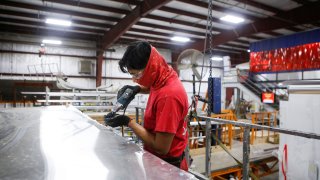
The economy's "growing pains" are on full display, one market analyst told CNBC on Friday after April's jobs report fell far short of expectations.
Stocks shrugged off the miss as investors hung on to hope that the Federal Reserve would continue to use its monetary policies to support the economic rebound.
Here's how five market watchers responded to the data:
Get Tri-state area news and weather forecasts to your inbox. Sign up for NBC New York newsletters.
Nela Richardson, chief economist at ADP, called it "a hugely disappointing number":
"This is something I think, just going around the horn, no one expected. But I really think that what we're seeing in the data is that the hiring we saw in March was really a recall of existing workers that were furloughed or laid off. And so, it wasn't adding new jobs, it was recalling existing workers, and there was obviously a slowdown this month. We'll need to dig through the numbers, but we all expect the momentum to build over time as the economy reopens. There is something structural, I think, going on right now in terms of the jobs market and how companies are repositioning their hiring to increase margins, to reduce risk and, for workers on the other side, reducing health risk. So, there's some structural things, not just cyclical, at play here, and I think it's going to take a bit more time to assess all this out because this is not expected as a number at all."
Kate Moore, head of thematic strategy for BlackRock's Global Allocation team, said the result could benefit parts of the equity market:
Money Report
"I think there are three things that really matter for the equity market right now, and I'm watching sort of the reaction in terms of the futures, but they are rates, they are policy and it's earnings, earnings being the last because we've had some very strong numbers that the market just didn't really want to reward. But I think that the rate story — which, of course, we're seeing this play out right now — is critically important, and then the path of policy. One of the things I was looking for in this number was whether or not we were going to get an incredibly strong print that was going to accelerate the change in Fed rhetoric and also change the calculation for when we would move up to, say, 1.75[%] or 2% on the 10-year. Seems like we're backing off right now and that's probably a good story for some of the parts of the equity market that de-rated as a result of higher rates."
Sara Malik, chief investment officer at Nuveen, anticipated some trouble for factor-based investing:
"This is about growing pains for the economy. We're just wrapping up first quarter going out with a bang and there's a lag here with employment data, but ... what we've been seeing is the style factors are no longer working consistently, this flip-flopping from growth working to value working. And as we get to the second quarter and we get to peak earnings growth, we think this is going to become more of an issue. It's not going to be about just owning growth or just owning value stocks. This is going to be about being more selective and finding those companies that can really benefit from stronger earnings, because investors are getting jittery and any piece of bad news, as we saw with Yellen's comments this week, take[s] the market down and that's going to continue to happen because valuations are high for this market."
Jason Furman, former chairman of the Council of Economic Advisers, found issues on multiple fronts in the labor market:
"This is a labor market that is 10 million jobs short of where it should be. But unlike the normal shortages that we have, I think this is just as much about a shortage of labor supply as it is about a shortage of labor demand. We have job openings at record levels. We have workers voting with their confidence in labor markets with near-record levels of quits. If you look at April, it appears that there were about 1.1 unemployed workers for every job opening. So, there are a lot of jobs out there, there just still is not enough labor supply. There also is not enough labor demand. So, the hope over the next coming months as the economy continues to reopen, as the vaccines succeed and work their magic, [is] that we're going to see a big increase in labor supply and we'll see a big increase in labor demand and those will be well matched. That's the Goldilocks scenario. But right now, we have both supply and demand problems."
Lori Heinel, global chief investment officer at State Street Global Advisors, urged investors to focus on the longer term:
"We don't want to make too much of [Friday] and ... our longer-term view is that we are in a recovery phase. We are in a pro-cyclical phase. We do think that that recovery's intact and that's going to provide support for that reflationary trade. But clearly, people are very skittish right now. The market has run pretty dramatically in the first part of the year, so, it's not surprising to see some folks perhaps take a little bit of profit-taking here, take a little bit of a breather here. But we've thought all along that this was really a two-year story, not a sprint in 2021, so, our view is that this is still an attractive entry point for stocks, but unlikely to get the kind of outsized gains in the short period of time that we've seen year to date."






